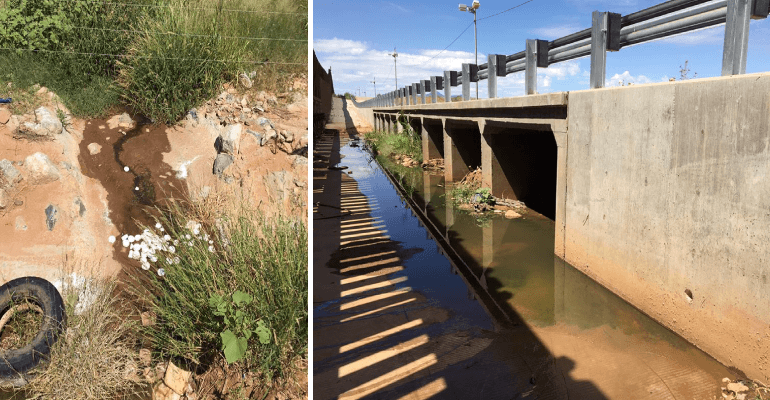
Once again, the Arizona Department of Environmental Quality is warning the public to avoid contact with water in the Nogales Wash and Potereo Creek due to sewage from Mexico. Currently there are “on-going potential for intermittent sanitary sewer overflows (SSOs) in a tunnel under the international border.
The tunnel was built to transport stormwater from Nogales, Sonora to the Santa Cruz River.
| ADEQ urges people to avoid access to local washes in this area. This recommendation is based on potential health risks to people and animals from contact with raw sewage associated with the SSO. Untreated sewage carries pathogens that pose a risk to human health and the environment. People and animals that come into contact with untreated sewage are at risk of infection from those pathogens. Depending on volume of flow and frequency, an SSO could threaten the Santa Cruz River. |
According to the Arizona Department of Environmental Quality (ADEQ), in January 2019, authorities notified the public of the sanitary sewer overflows (SSOs) potential, due to pump failures at the wastewater treatment plant in Nogales, Sonora.
The pumps have been repaired or replaced, but an issue with electrical connections continues to be a problem.
The U.S. and Mexico sections of the International Boundary and Water Commission (IBWC) are in contact with the utility in Nogales, Sonora, according to ADEQ, which is working to resolve factors contributing to the intermittent SSOs.
ADEQ says it continues to monitor the situation and is also in contact with IBWC, the utility in Nogales, Sonora, the City of Nogales, Arizona and the Santa Cruz County Health Department.
Recommended Actions:
Avoid contact with the water in this area, including wading, drinking and washing. If you have contact with the water, rinse using soap and clean water immediately.
Take care that pets and livestock do not drink potentially affected water. Pets can be especially susceptible because they tend to drink while in the water and lick their fur after exposure. Rinse pets using soap and clean water.
If you think that your health or that of your pet or livestock has been affected from exposure to raw sewage, seek medical treatment immediately. Be sure to tell the medical professional about contact with the SSO. Also, make sure to advise your local county public health department about the exposure details.
